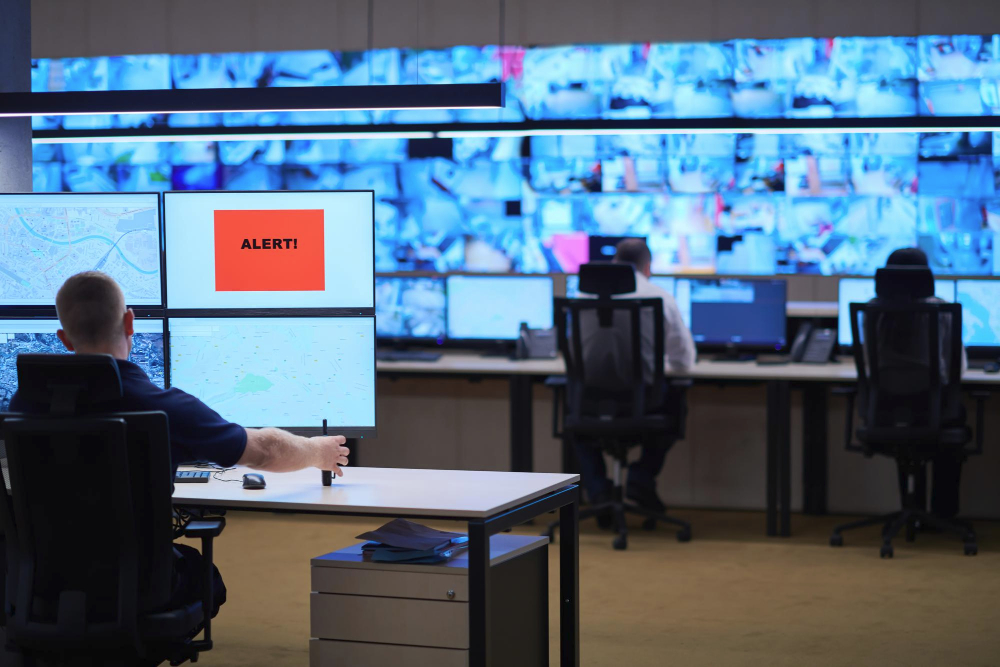Introduction: The Importance of Neighborhood Patrol Security
Welcome to our blog post on neighborhood patrol security, where we dive into the importance of safeguarding our streets and explore effective ways to ensure a safe community for all. Picture this: a close-knit neighborhood, where neighbors look out for one another, creating an environment that is not only secure but also fosters a sense of belonging. That's what neighborhood patrol security is all about – an organized effort by residents to keep their streets safe and protect their homes from potential threats. So, join us as we delve into the world of neighborhood patrols and discover how they can make a significant difference in maintaining peace and tranquility right outside your doorstep!
What is Neighborhood Patrol Security?
Neighborhood patrol security is a vital component of maintaining the safety and well-being of our communities. It involves a group of dedicated individuals who take it upon themselves to keep a watchful eye on their neighborhood, ensuring that any suspicious activities or potential threats are promptly reported.

These patrols can be organized by residents, community organizations, or even local law enforcement agencies. The goal is simple: to create a strong sense of security within the neighborhood and deter criminal activity.
Neighborhood patrol members often undergo training to learn about effective surveillance techniques, how to identify signs of suspicious behavior, and how to communicate with law enforcement when necessary. They are taught the importance of being observant without being confrontational - their role is primarily one of observation and reporting rather than direct intervention.
The presence of a neighborhood patrol alone can act as a deterrent for criminals. Knowing that there are vigilant eyes watching over the community can dissuade potential wrongdoers from targeting the area. Additionally, these patrols serve as an early warning system, allowing residents to be more proactive in addressing any emerging issues before they escalate.
By organizing regular meetings and communication channels among neighbors involved in the patrol, valuable information can be shared quickly and efficiently. This not only helps in identifying patterns or trends but also fosters a stronger bond within the community itself.
Neighborhood patrol security plays an essential role in safeguarding our streets. It empowers residents to actively participate in creating safer environments for everyone. By working together as a cohesive unit focused on vigilance and cooperation with law enforcement agencies when needed, we can ensure that our neighborhoods remain secure places where families feel safe to live and thrive.
Benefits of Having a Neighborhood Patrol
Neighborhood patrol security is an essential aspect of maintaining a safe and secure community. Having a neighborhood patrol brings about numerous benefits that contribute to the overall well-being of residents.
One significant benefit is the increased sense of safety and peace of mind. Knowing that there are dedicated individuals actively patrolling the streets can provide reassurance to residents, especially during times when crime rates may be higher.
Another advantage is the deterrence factor. Neighborhood patrols act as a visible presence in the community, deterring potential criminals from engaging in illegal activities. The mere knowledge that there are watchful eyes on the lookout for suspicious behavior can significantly reduce criminal activity in an area.
Additionally, having a neighborhood patrol fosters a strong sense of community unity. Residents who participate in these patrols often develop close relationships with one another, creating a tight-knit support system within their neighborhood. This cohesion not only enhances safety but also promotes social interaction and connectedness among neighbors.
Furthermore, neighborhood patrols serve as an effective way to address specific concerns or issues within a community. Whether it's monitoring traffic violations, addressing noise complaints, or keeping an eye out for vandalism, these patrols allow residents to take control over their environment and work together towards solutions.
Having a neighborhood patrol offers various benefits that contribute to creating safer neighborhoods and fostering stronger communities. From providing enhanced security and deterrence to promoting unity among residents and addressing local concerns – everyone has something to gain by actively participating in this proactive approach towards safeguarding our streets.
How to Organize a Neighborhood Patrol
Organizing a neighborhood patrol is an important step towards ensuring the safety and security of your community. By working together, residents can create a strong network of vigilant individuals who are committed to keeping their streets safe from crime.
It's crucial to gather interested members within your community who are willing to volunteer their time for this initiative. This can be done by spreading the word through flyers, social media groups, or even organizing a neighborhood meeting. The more people you have involved, the stronger and more effective your patrol will be.
Once you have established a group of dedicated volunteers, it's essential to establish clear roles and responsibilities. Assign someone as the leader or coordinator who will oversee communication and organization among team members. It's also important to divide specific tasks such as patrolling schedules, documenting suspicious activities or incidents, and liaising with local law enforcement.
Next, consider creating guidelines for conduct during patrols. These may include rules about staying in well-lit areas, avoiding confrontations with suspects directly while gathering information discreetly instead.
Training sessions should be organized regularly for all members involved in order to enhance their knowledge on basic security protocols and techniques such as recognizing suspicious behavior or reporting incidents effectively.
Additionally, establishing good communication channels among patrol members is vital for quick response times if any emergency situation arises. Utilize technology like walkie-talkies or group messaging apps that allow instant updates amongst the team.
Remember that maintaining relationships with local law enforcement agencies is crucial for successful neighborhood patrols. They can provide valuable guidance on how best to serve your community while also offering support when needed.
Training and Responsibilities of Neighborhood Patrol Members
Neighborhood patrol security is a crucial aspect of maintaining a safe and secure community. To effectively carry out this responsibility, it is important for neighborhood patrol members to undergo proper training and understand their responsibilities.
First and foremost, all members should receive training on basic security procedures. This includes learning how to identify suspicious activities, understanding local laws and regulations, and knowing when to report incidents to the authorities. Training sessions can also cover conflict resolution techniques and effective communication skills.
Once trained, neighborhood patrol members have various responsibilities that contribute to the overall safety of the community. They are responsible for conducting regular patrols in designated areas, keeping an eye out for any signs of criminal activity or potential threats. It is essential for them to be vigilant at all times.
Additionally, neighborhood patrol members often act as extra eyes and ears for law enforcement agencies. They play a key role in reporting any unusual behavior or suspicious individuals they encounter during their patrols. Their quick thinking and accurate reporting can greatly assist law enforcement in preventing crimes before they happen.
Moreover, collaboration within the neighborhood patrol team is vital. Members should communicate regularly with each other regarding any observations or concerns they may have encountered during their patrols. By sharing information effectively, they can better coordinate efforts towards safeguarding the community.
Lastly but equally important, neighborhood patrol members should establish positive relationships with residents in their area. Building trust among community members helps foster cooperation between neighbors and encourages active participation in reporting suspicious activities or addressing safety concerns.
Maintaining a Safe and Secure Community
Creating a safe and secure community is a shared responsibility that requires the active participation of every resident. While neighborhood patrol security plays an important role in safeguarding our streets, there are several other measures we can take to ensure the well-being of our community.
Communication among neighbors is key. Establishing strong relationships with those who live nearby fosters trust and enhances overall safety. By keeping each other informed about any suspicious activities or concerns, we can collectively address potential threats before they escalate.
Implementing effective lighting strategies is crucial. A well-lit neighborhood serves as a deterrent for criminals by minimizing hidden spots and increasing visibility for residents and patrolling members alike.
Furthermore, it's essential to encourage everyone to report any incidents promptly. Timely reporting allows law enforcement agencies to respond quickly and allocate resources efficiently.
Additionally, organizing regular community meetings where residents can discuss safety concerns helps identify specific issues unique to the neighborhood. Collaboratively finding solutions ensures that everyone's voice is heard and contributes to a safer environment.
Promoting education regarding personal safety measures empowers individuals within the community. Sharing tips on securing homes, being vigilant while walking alone at night, or establishing emergency plans equips residents with knowledge necessary for their own protection.
Remember: maintaining a safe and secure community goes beyond relying solely on neighborhood patrol security; it involves active engagement from all residents in taking preventative steps towards ensuring the well-being of ourselves and our neighbors.
Conclusion: The Role of Everyone in Safeguarding Our Streets
In our quest for a safe and secure community, neighborhood patrol security plays a vital role. It is not just the responsibility of law enforcement agencies to ensure the safety of our streets; it is a collective effort that requires active participation from every member of the community.

By organizing neighborhood patrols, we empower ourselves to take control over our surroundings and make a real difference in preventing crime. Through regular patrols and vigilant observation, we can deter potential criminals and create an environment where everyone feels safe.
The benefits of having a neighborhood patrol are significant. Not only does it provide an extra layer of security, but it also fosters unity among residents as they come together with a shared goal – protecting their homes and loved ones. By working together, we build stronger relationships within our communities and improve overall quality of life.
To organize an effective neighborhood patrol, communication is key. Reach out to your neighbors through meetings or social media platforms to gauge interest and recruit volunteers. Establish clear guidelines for patrol schedules, routes, reporting procedures, and emergency contacts.
Training should be provided to all members to enhance their skills in observation techniques, conflict resolution, first aid knowledge if necessary etc., making them better equipped to handle various situations they may encounter while on duty.
Remember that maintaining a safe community goes beyond just patrolling the streets. Encourage open lines of communication between neighbors by setting up watch groups or online platforms where individuals can share information about suspicious activities or concerns they may have.

